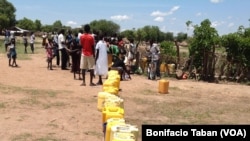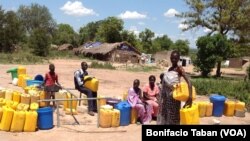ARUA, UGANDA —
Sarah Nyagut Ding spends about an hour and a half every day, waiting for her turn to draw water from a pump in the Ocea sector in Rhino resettlement camp in Uganda.
Ding is one of more than 4,000 South Sudanese refugees who have lived in the tightly packed Ocea cluster since fighting broke out in South Sudan more than four months ago.
The refugees are not only battling homesickness and fear for the future of their country, but also tough challenges in the camp, including a chronic shortage of clean water that has led to tensions with the local community.
Women like Ding wait in line for hours to pump water from boreholes or to draw their share of water from 10,000-liter tanks.
Because the refugee population at the settlement has doubled in the past four months, and because the refugees are competing with locals for water, very often, Ding and the others go home from the pump empty-handed.
"Most of us stay a week without bathing. Some of us go to a nearby dirty stream to collect water. We try to treat the dirty water with ash tree to kill the germs so we can drink it," she said.
The lack of water has led to fights between locals and refugees, another South Sudanese refugee, Kidden Ester, said.
"Sometimes, the natives threaten the Sudanese and then they start fighting," Ester said.
Simon Peter, the chair of a committee set up by the refugees in the Ocea cluster, said there simply is not enough water to go around at the settlement.
"We have four boreholes. One of them is OK -- it can give us enough water -- but the other three, if you pump to fill one jerry can, it will take half an hour. And sometimes after four or six jerry cans, the water will stop," he said.
Another problem is that the 10,000-liter water tanks are not always delivered. When they don't show up, refugees have to go without water for days, Peter said.
Assistant settlement commander Abili David said the camp authorities are working to address the water problem by bringing in a specialist company to drill for water, and community leaders are trying to patch things up between locals and the refugees.
More than 900,000 people have been displaced inside South Sudan and nearly 300,000 have fled to neighboring countries, including Uganda, since fighting broke out four months ago between pro- and anti-government forces.
Uganda has taken in more than 98,000 South Sudanese refugees -- the largest number of any country in the region. Around 15,000 South Sudanese live in Rhino resettlement camp, which is divided into 13 sectors -- the most densely populated of which is the Ocea cluster.
Ding is one of more than 4,000 South Sudanese refugees who have lived in the tightly packed Ocea cluster since fighting broke out in South Sudan more than four months ago.
The refugees are not only battling homesickness and fear for the future of their country, but also tough challenges in the camp, including a chronic shortage of clean water that has led to tensions with the local community.
Women like Ding wait in line for hours to pump water from boreholes or to draw their share of water from 10,000-liter tanks.
Because the refugee population at the settlement has doubled in the past four months, and because the refugees are competing with locals for water, very often, Ding and the others go home from the pump empty-handed.
"Most of us stay a week without bathing. Some of us go to a nearby dirty stream to collect water. We try to treat the dirty water with ash tree to kill the germs so we can drink it," she said.
The lack of water has led to fights between locals and refugees, another South Sudanese refugee, Kidden Ester, said.
"Sometimes, the natives threaten the Sudanese and then they start fighting," Ester said.
Simon Peter, the chair of a committee set up by the refugees in the Ocea cluster, said there simply is not enough water to go around at the settlement.
"We have four boreholes. One of them is OK -- it can give us enough water -- but the other three, if you pump to fill one jerry can, it will take half an hour. And sometimes after four or six jerry cans, the water will stop," he said.
Another problem is that the 10,000-liter water tanks are not always delivered. When they don't show up, refugees have to go without water for days, Peter said.
Assistant settlement commander Abili David said the camp authorities are working to address the water problem by bringing in a specialist company to drill for water, and community leaders are trying to patch things up between locals and the refugees.
More than 900,000 people have been displaced inside South Sudan and nearly 300,000 have fled to neighboring countries, including Uganda, since fighting broke out four months ago between pro- and anti-government forces.
Uganda has taken in more than 98,000 South Sudanese refugees -- the largest number of any country in the region. Around 15,000 South Sudanese live in Rhino resettlement camp, which is divided into 13 sectors -- the most densely populated of which is the Ocea cluster.





